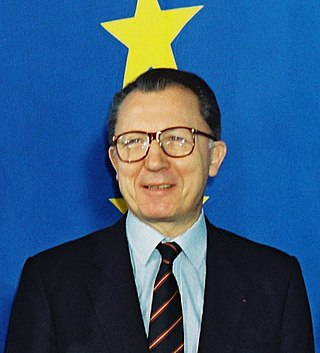
The European Commission (EC) is the primary executive arm of the European Union (EU). It operates as a cabinet government, with 27 members of the Commission headed by a President. It includes an administrative body of about 32,000 European civil servants. The commission is divided into departments known as Directorates-General (DGs) that can be likened to departments or ministries each headed by a Director-General who is responsible to a Commissioner.

The president of the European Commission, also known as president of the College of Commissioners or prime commissioner, is the head of the European Commission, the executive branch of the European Union (EU). The president of the commission leads a cabinet of commissioners, referred to as the college. The president is empowered to allocate portfolios among, reshuffle, or dismiss commissioners as necessary. The college directs the commission's civil service, sets the policy agenda and determines the legislative proposals it produces. The commission is the only body that can propose, or draft, bills to become EU laws.

The Democratic Party, is the major social-liberal political party in Luxembourg. One of the three major parties, the DP sits on the centre to centre-right, holding moderate market liberal views combined with a strong emphasis on civil liberties, human rights, and internationalism.

Gaston Egmond Thorn was a Luxembourgish politician who served in a number of high-profile positions, both domestically and internationally. Amongst the posts that he held were the 20th prime minister of Luxembourg (1974–1979), President of the United Nations General Assembly (1975), and the seventh president of the European Commission (1981–1985).

Marek Marian Belka is a Polish professor of economics and politician who has served as Prime Minister of Poland and Finance Minister of Poland in two governments. He is a former director of the International Monetary Fund's (IMF) European Department and former Head of Narodowy Bank Polski. He has served as a Member of the European Parliament (MEP) since July 2019.

The Delors Commission was the administration of Jacques Delors, the eighth President of the European Commission. Delors presided over the European Commission for three terms. The first term lasted from 1985 to 1988, the second until 1992 and the final one until 1994, making Delors the longest serving president, and his Commission is also seen as the most successful at advancing European integration. It was the only Commission to serve three times, and Delors served five two-year terms. The third Commission was the first Commission of the European Union, the Maastricht Treaty having come into force in 1993.

Helle Thorning-Schmidt is a Danish retired politician who served as the 26th Prime Minister of Denmark from 2011 to 2015, and Leader of the Social Democrats from 2005 to 2015. She is the first woman to have held each post. Following defeat in 2015, she announced that she would step down as both Danish Prime Minister and Social Democratic party leader. Ending her political career in April 2016, she was the chief executive of the NGO Save the Children until June 2019.

Margrethe Vestager is a Danish politician currently serving as Executive Vice President of the European Commission for A Europe Fit for the Digital Age since December 2019 and European Commissioner for Competition since 2014. Vestager is a member of the Danish Social Liberal Party, and of the Alliance of Liberals and Democrats for Europe Party (ALDE) on the European level.

Franciscus Henricus Johannes Joseph "Frans" Andriessen was a Dutch politician of the Catholic People's Party (KVP) and later the Christian Democratic Appeal (CDA) and businessperson who served as European Commissioner from 6 January 1981 until 6 January 1993. He served as Minister of Finance from 1977 until 1980, and as the Netherlands' European Commissioner from 1981 until 1993.
The Jenkins Commission was the European Commission that held office from 6 January 1977 to 6 January 1981. Its President was Roy Jenkins.
The Hallstein Commission is the European Commission that held office from 7 January 1958 to 30 June 1967. Its president was Walter Hallstein and held two separate mandates.

The history of the European Communities between 1958 and 1972 saw the early development of the European Communities. The European Coal and Steel Community (ECSC) had just been joined by the European Atomic Energy Community (Euratom) and the European Economic Community (EEC), the latter of which soon became the most important. In 1967 the EEC's institutions took over the other two with the EEC's Commission holding its first terms under Hallstein and Rey.

Between 1973 and 1993 the European Communities saw the first enlargement of the Communities. On 1 January 1973, Denmark, Ireland, and the United Kingdom became the first countries to join the Communities. The détente allowed initiation of the reunification of the continent through establishing the Conference on Security and Co-operation in Europe. Greece was the next to join EC on 1 January 1981, followed by Spain and Portugal joining on 1 January 1986, while Turkey has initiated the procedure in 1987. Upon the fall of the Iron Curtain, the CSCE was transformed in 1990 into Organization for Security and Co-operation in Europe, the Communities enlarged for a fourth time through the German reunification, while other former communist European countries stated their firm commitment to join, prompting formulation of the Copenhagen criteria. This period was, however, also the one which witnessed the first voluntary exit from the Communities, namely the one of Greenland in 1985. The integration progressed under the Delors Commission resulting in the creation of the European Union in 1993.

Wilhelm Haferkamp was a longtime member of the European Commission. Born in Germany, he was a social democratic politician. He was appointed to the commission by the West German government in 1967. He served in a number of posts including Vice President until 1985. He died in Brussels.

The history of the European Union between 1993 and 2004 was the period between its creation and the 2004 enlargement. The European Union was created at the dawn of the post–Cold War era and saw a series of successive treaties laying the ground for the euro, foreign policy and future enlargement. Three new member states joined the previous twelve in this period and the European Economic Area extended the reach of the EU's markets to three more.

Dennis Kennedy is a writer on Irish and European affairs. His most recent publications include Square Peg; The Life and Times of a Northern Newspaperman South of the Border, Nonsuch, November 2009, and Climbing Slemish: An Ulster Memoir.

Margaritis Schinas is a Greek politician and former civil servant. He took office in December 2019 as a vice-president in the Von der Leyen Commission with the portfolio of European Commissioner for Promoting our European Way of Life. A member of the New Democracy party, he previously was a Member of the European Parliament (MEP) from 2007 to 2009 and served as chief spokesperson of the European Commission from 2014 to 2019, and as a deputy director-general of the European Commission's Directorate-General for Communication between 2015 and 2019.

Karl-Heinz Narjes was a German Christian Democratic (CDU) politician. From 1969 to 1973 he was Minister for Economy and Transport of the State of Schleswig-Holstein and from 1981 to 1988 he was a European Commissioner.
Giorgos Kontogeorgis was a Greek economist who became a civil servant and politician. He played a crucial role in planning Greece's accession to the European Economic Community (EEC) in 1981, and he became Greece's first European Commissioner.
















